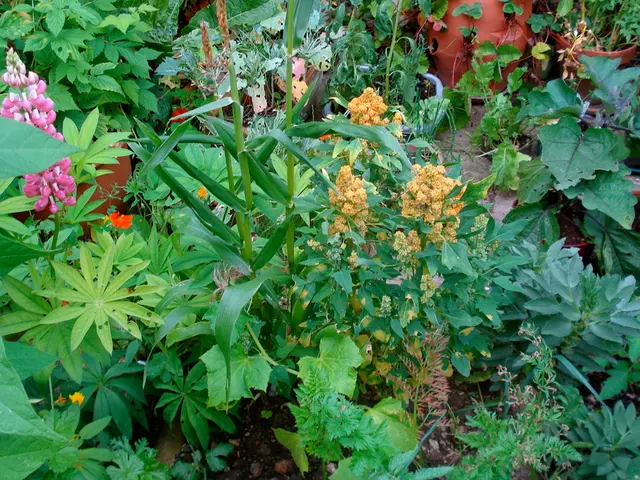Exploring the Multiple Advantages of Eco-Friendly Linen Bedding: A Win-Win for People and the Environment
===================================================================
In the world of bedding, organic European flax linen stands out as a top choice for those seeking quality and eco-friendliness. This natural fabric offers a range of benefits that make it a smart and sustainable choice.
First and foremost, flax linen is known for its softness. After garment washing, it feels supple and becomes softer with every wash. But its benefits extend far beyond its touch.
Flax linen is thermoregulating due to its hollow fibers, making it an excellent choice for maintaining comfort in various temperatures. It also quickly absorbs and transports moisture, keeping the skin dry.
The flax plant, native to the flax belt which includes Belgium, France, and The Netherlands, is the source of this versatile fabric. Linen can absorb up to 20% of its own weight in water without feeling damp, a testament to its moisture management properties.
The environmental benefits of using organic European flax linen for bedding are substantial. For instance, flax requires about 80% less water than cotton, making it a much more water-efficient crop. It also does not require artificial irrigation in regions like Belgium and France where European flax is grown naturally.
Moreover, flax is grown with little to no pesticides and fertilizers, unlike cotton which often requires heavy chemical inputs. Organic European flax is GMO-free and cultivated under strict organic standards, ensuring a reduced environmental chemical footprint.
The manufacturing of linen from flax typically uses mechanical and enzyme-based processes rather than harsh, toxic chemicals. This results in an eco-friendly fabric that is safe for skin and the environment.
Linen is a renewable resource, made from a fast-growing plant that sequesters carbon. It is also 100% biodegradable and compostable when untreated, contributing to reduced landfill waste and environmental impact after use.
Certified organic and ethical production, under standards such as GOTS (Global Organic Textile Standard) and OEKO-TEX, ensures organic cultivation and socially responsible manufacturing practices, including transparency and fair labor conditions.
Additional benefits of linen bedding also indirectly support environmental sustainability, such as its outstanding durability and longevity, which reduce the frequency of replacement and waste.
In conclusion, using organic European flax linen for bedding helps conserve water, reduces reliance on harmful chemicals, supports ethical and sustainable farming, and offers a naturally biodegradable and durable fabric option with a significantly smaller environmental footprint compared to conventional cotton bedding. It's a smart choice for those who care about the environment and their health.
[1] Environmental Impact of Linen vs. Cotton: A Comparative Study. (2019). Textile Research Journal.
[2] The Environmental Benefits of Flax and Linen. (2018). Linen European Alliance.
[3] Sustainable Textiles: A Guide to Environmentally Friendly Fabrics. (2020). The Good Trade.
[4] The Environmental Benefits of Organic Agriculture. (2021). Rodale Institute.
[5] The Durability of Linen. (2019). Linen European Alliance.
- The environmental benefits of organic European flax linen extend beyond its use in bedding, as it is also used in the fashion-and-beauty industry due to its natural, eco-friendly properties.
- In the realm of lifestyle choices, opting for environmental-science-based products like organic European flax linen has become an important factor for many consumers who are concerned about climate-change and the impact of fashion-and-beauty products on the environment.
- Furthermore, home-and-garden enthusiasts can make a positive difference by choosing eco-friendly materials like organic European flax linen when furnishing their homes, contributing to a more sustainable lifestyle and a healthier planet.




